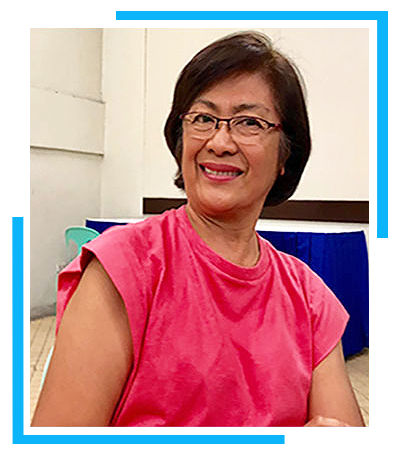
Anicia Q. Hurtado was a Senior Scientist at the Aquaculture Department, Southeast Asian Fisheries Development Center (SEAFDEC-AQD), Tigbauan, Iloilo, Philippines for more than 20 years. She spearheaded the Seaweed Program of AQD during her entire career at the Center. She is at present the Chair of the Integrated Services for the Development of Aquaculture and Fisheries (ISDA Inc.), an organization of past and present scientists of SEAFDEC-AQD. She finished her Doctor of Agriculture (Phycology) at Kyoto University, Kyoto, Japan in 1988 as a Monbusho scholar.
She worked closely with seaweed farmers as consultant of international funding agencies like WB-IFC, ADB, USAID, AusAID, GTZ, Cargill, ZSL, local agencies like PDAP, and government agency DA-BFAR in the pursuit of sustainable seaweed farming from lab-sea-based nurseries to field cultivation. She is the lead Editor of the Book - Tropical Seaweed Farming Trends, Problems and Opportunities: Focus on Spinosum and Cottonii of Commerce published by Springer Nature in November 2017. She is currently involved as the Developing Country Partner (Phil.) of the GCRF-UKRI GlobalSeaweed* Project, a 4 –year project (Oct 2017- Dec 2021) on the ‘Sustainability of Seaweed Aquaculture in the Developing Countries’ at the University of the Philippines Visayas, Miag-ao Iloilo.
She is a member of the UK International Peer Review College since February 2018 as a reviewer of Proposals submitted for possible funding by UKRI-GCRF. She has written several scientific papers published in peer-reviewed journals from micropropagation, farm management, disease mitigation to colloid characterization of Gracilaria and Kappaphycus. Likewise, she is book chapter contributor to some Algal Books. She is also a regular reviewer of manuscripts submitted to peer-reviewed journals like Algal Research, Journal of Applied Phycology, Aquaculture, Aquaculture Research, Journal Marine Policy and Botanica Marina, to name a few.
She worked closely with seaweed farmers as consultant of international funding agencies like WB-IFC, ADB, USAID, AusAID, GTZ, Cargill, ZSL, local agencies like PDAP, and government agency DA-BFAR in the pursuit of sustainable seaweed farming from lab-sea-based nurseries to field cultivation. She is the lead Editor of the Book - Tropical Seaweed Farming Trends, Problems and Opportunities: Focus on Spinosum and Cottonii of Commerce published by Springer Nature in November 2017. She is currently involved as the Developing Country Partner (Phil.) of the GCRF-UKRI GlobalSeaweed* Project, a 4 –year project (Oct 2017- Dec 2021) on the ‘Sustainability of Seaweed Aquaculture in the Developing Countries’ at the University of the Philippines Visayas, Miag-ao Iloilo.
She is a member of the UK International Peer Review College since February 2018 as a reviewer of Proposals submitted for possible funding by UKRI-GCRF. She has written several scientific papers published in peer-reviewed journals from micropropagation, farm management, disease mitigation to colloid characterization of Gracilaria and Kappaphycus. Likewise, she is book chapter contributor to some Algal Books. She is also a regular reviewer of manuscripts submitted to peer-reviewed journals like Algal Research, Journal of Applied Phycology, Aquaculture, Aquaculture Research, Journal Marine Policy and Botanica Marina, to name a few.
